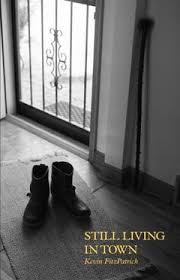| <- Back to main page |
(Midwest Villages & Voices)
Over a century after Robert Frost published North of Boston, rural America is still a foreign country to most city folk—a reality driven home by Kevin FitzPatrick's new collection of poems, Still Living in Town. Mending walls have been replaced with electric fences, and balers are now machines rather than people, but lambing is pretty much the same, and hay is still a very big deal.
The contemplative reverie of "After Apple-Picking" is curiously absent in this talky, autobiographical collection; instead country life is illuminated as a busy, complicated enterprise. The poems are prosy vignettes that weave together to form a narrative, a bit like an episodic novel, and the heroine is clearly FitzPatrick's partner, the ever-industrious Tina. The main plotline is sketched out in "Shoveling Wood Chips":

I suggested we buy a weekend retreat
when Tina talked of needing a change:
a lake cabin without power or running water
where we'd fish, read, doze, and never mow the lawn.
She envisioned an eighty-acre farm with animals,
fruit trees, large gardens with vegetables,
grapes, berries, alfalfa fields for hay,
woodlands for fuel, a way of life.
Clearly, it's Tina's vision that has prevailed. The poet himself, as the book's title suggests, remains living in town, but visits the farm often and seems so overwhelmed with work you begin to feel for the poor guy. In "Seventy Chickens" his reaction to the economical slaughter of their barnyard fowl is what one might expect of a poet:
I am about to say I'll never eat chicken again
when Tina comes in requesting we cut up,
package, and freeze the birds before dark,
but we can wash, disinfect, and put away
the killing post, feather plucker,
knives, tables, bins and dispose
the heads, blood, and entrails in the morning.
This isn't confessional verse, as deep emotions lie well below the surface. Rather, it's a sort of reality poetry. FitzPatrick is so focused on the farm work that its easy to overlook the craft that goes into making the poems themselves—they are much more than simple prose snippets evenly broken out into lines. The first line in the quote above, for example, is a smooth pentameter of alternating iambic and anapestic feet.
Living in Town does relocate to the city for one section, filled with gas stations, barbers, coworkers, and a St. Patrick's Day parade, but it feels more than anything like a break in the story, and we're soon back to Tina's efforts to get all the hay harvested, make carrot wine, let the ram Cowboy loose among the ewes, ride Vino, her Belgian draft horse, and learn to drive her new Bobcat skid-steer loader. FitzPatrick seems merely along for the ride. Though he invokes Seamus Heaney and James Wright, he has only a few personal moments to himself in this business-like collection, such as a dream he relates in "Harvest Time":
Last night I dreamed I was in Bridget's kitchen,
a woman I loved years ago but left
as my grand post-college plans did not include
marriage and children, nor did it, I might add,
include these fruits and vegetables.
Fruits and vegetables and dogs and horses and sheep and chickens—Still Living in Town is a collection animated with life. Though it might not inspire you to sell everything and buy a farm, it does make you feel as if you'd taken an extended vacation in the country.
- Joel Van Valin 